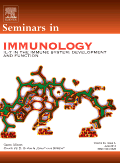
SEMINARS IN IMMUNOLOGY
Scope & Guideline
Leading the Charge in Immunological Research
Introduction
Aims and Scopes
- Mechanisms of Immune Responses:
The journal explores the fundamental mechanisms underlying immune responses, including innate and adaptive immunity, T cell dynamics, B cell function, and the role of various immune cell types in health and disease. - Immunological Disorders and Diseases:
Research on the immunological basis of various disorders such as allergies, autoimmune diseases, cancer, and infectious diseases, providing insights into potential therapeutic interventions and disease management. - Innovative Therapeutic Approaches:
The journal highlights novel immunotherapeutic strategies, including cancer immunotherapy, vaccine development, and the use of nanoparticles and other technologies to enhance immune responses. - Microbiome and Immunity:
An increasing focus on the interactions between the microbiome and immune system, including how microbiota influences immune development and responses, particularly in allergy and autoimmune conditions. - Aging and Immunity:
Research addressing the impact of aging on immune function, including the mechanisms of immunosenescence and its implications for vaccine responsiveness and disease susceptibility.
Trending and Emerging
- COVID-19 Immunology:
A significant increase in research focused on immune responses to SARS-CoV-2, including vaccine efficacy, long-term immunity, and the role of specific immune cells in controlling the virus, indicates a strong trend towards addressing contemporary global health challenges. - Pyroptosis and Cell Death Mechanisms:
The growing interest in pyroptosis and other regulated forms of cell death as critical components of immune responses and their implications for diseases such as cancer and chronic inflammation is emerging as a key area of research. - Cancer Immunotherapy Innovations:
There is a notable trend towards exploring novel immunotherapeutic strategies, including CAR T-cell therapies, checkpoint inhibitors, and the role of tumor-associated immune cells in enhancing antitumor response. - Microbiome-Immune Interactions:
The relationship between the microbiome and immune function is gaining traction, with an emphasis on how gut microbiota influences immunity, particularly in allergic diseases and cancer. - Aging and Immunity:
Research exploring the effects of aging on immune function and the implications for vaccine development and disease susceptibility is becoming increasingly prominent, reflecting a growing awareness of the challenges posed by an aging population.
Declining or Waning
- Helminth Immunology:
Research on type 2 immunity and helminth infections has decreased, possibly due to a broader focus on more pressing issues such as COVID-19 and cancer immunotherapy. - Neutrophils in Non-Cancer Contexts:
While neutrophils remain a topic of interest, studies specifically focused on their roles outside of cancer contexts have waned, as the field increasingly focuses on their dual roles in cancer and inflammation. - Traditional Vaccinology:
The exploration of traditional vaccine development approaches has diminished, as the field shifts towards more innovative strategies like mRNA vaccines and personalized immunotherapies. - Cytokine Regulation in Autoimmunity:
Although still relevant, the frequency of publications focusing solely on cytokine regulation in autoimmune diseases appears to be decreasing amid a broader search for integrative approaches to immunoregulation.
Similar Journals

Annual Review of Immunology
Advancing the Frontiers of Immunological ResearchThe Annual Review of Immunology, published by Annual Reviews, is a premier journal that has been contributing to the field of immunology since its establishment in 1983. With a strong reputation highlighted by its impressive impact factor and top-tier rankings—holding the Q1 category in both Immunology and Immunology and Allergy, alongside significant Scopus Rankings—this journal serves as an essential resource for researchers, professionals, and students alike. The Annual Review of Immunology covers the latest advancements and critical developments in the domain, fostering a better understanding of immune responses and disorders. Although it is not an open-access journal, it provides comprehensive reviews that synthesize emerging data and trends, making it indispensable for those at the forefront of immunological research. With volumes anticipated through 2024, it continues to set the standard for high-quality scholarly publications in the field.
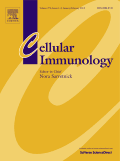
CELLULAR IMMUNOLOGY
Transforming Insights into Cellular Immune DynamicsCELLULAR IMMUNOLOGY is a prestigious journal published by Academic Press Inc. Elsevier Science, dedicated to advancing the field of immunology. Established in 1970 and converging ongoing research up to 2024, this journal has carved out a significant niche within the academic community, boasting a notable Q2 ranking in the Immunology category and holding a respectable 67th percentile ranking within Scopus for its contributions to the disciplines of Immunology and Microbiology. The journal serves as a vital platform for disseminating high-quality research, reviews, and methodologies that elucidate the intricacies of cellular immune responses, thereby benefiting researchers, professionals, and students alike. Although it does not offer open access, the journal's impact is evidenced by its comprehensive coverage of pioneering studies and ongoing developments in the immunological sciences, positioning it as an essential resource for those seeking to deepen their understanding and engage with the latest findings in cellular immunology.

Mucosal Immunology
Unveiling the Secrets of Mucosal DefenseMucosal Immunology, published by Elsevier Science Inc, is a leading journal dedicated to advancing the field of immunology with a particular focus on mucosal immunity. Since its inception in 2008, the journal has established itself as a premier source of cutting-edge research, evidenced by its impressive Q1 ranking in both Immunology and Allergy for 2023, and its notable positions within the top ranks of Scopus (Rank #21/233 in Immunology and Allergy and Rank #24/236 in Immunology and Microbiology). The journal serves as a vital resource for researchers, professionals, and students aiming to explore the complexities of mucosal immune responses and their implications in health and disease. While it operates under a subscription model, Mucosal Immunology is committed to disseminating quality research globally and enhancing collaborative efforts within the scientific community. Explore the latest findings and connect with influential scholarship in this rapidly evolving field.
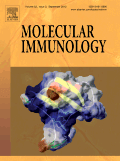
MOLECULAR IMMUNOLOGY
Pioneering Insights into Molecular ImmunologyMOLECULAR IMMUNOLOGY, published by Pergamon-Elsevier Science Ltd in the United Kingdom, is a highly regarded journal in the fields of Immunology and Molecular Biology. With a focus on advancing the understanding of the immune system at the molecular level, the journal has been a critical resource since its inception in 1975. The journal is currently listed in the second quartile (Q2) of its category as per the 2023 rankings, indicating its substantial impact in both Immunology and Molecular Biology research. Researchers and professionals benefit from the journal's rigorous peer-review process and its commitment to publishing high-quality original research, reviews, and methodological studies that explore the intricate dynamics of immune responses. Although it does not currently offer an open access option, MOLECULAR IMMUNOLOGY remains an essential platform for scholars, emphasizing the significance of molecular interactions within the immune system and their implications in health and disease.
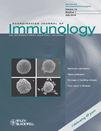
SCANDINAVIAN JOURNAL OF IMMUNOLOGY
Pioneering Research at the Intersection of Immunology and MedicineScandinavian Journal of Immunology is a prestigious peer-reviewed journal published by Wiley, focused on the evolving field of immunology and its interdisciplinary ties with medicine. Since its inception in 1972, this journal has cultivated a rich repository of knowledge, showcasing innovative research and reviews that contribute to the understanding of immune system functions, disorders, and therapeutic interventions. With an impressive impact factor reflecting a Q2 ranking in Immunology and a top-tier Q1 status in miscellaneous Medicine categories for 2023, it is recognized for its high-quality scholarly output, positioning it among the leading journals in the field. Additionally, its Scopus ranking of #84 out of 236 in Immunology underscores its significance and relevance to both emerging and established researchers. Although it does not currently offer open access options, the journal’s expansive reach and rigorous publication standards make it an essential platform for disseminating impactful research to the global scientific community. The journal invites submissions that explore the complexities of the immune system, aiming to bridge clinical and basic science for a comprehensive understanding of immunological phenomena.
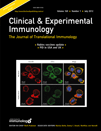
CLINICAL AND EXPERIMENTAL IMMUNOLOGY
Transforming Research into Clinical PracticeClinical and Experimental Immunology, published by Oxford University Press, is a premier journal that has been a cornerstone in the field of immunology since its inception in 1966. With an ISSN of 0009-9104 and an E-ISSN of 1365-2249, this journal holds a significant position in academic research, currently ranking in the Q2 category for both Immunology and Allergy (2023). Its impactful contributions are reflected in its Scopus rankings, where it stands at Rank #63 out of 233 in Immunology and Allergy, placing it in the 73rd percentile, and Rank #73 out of 236 in Immunology and Microbiology. Researchers, healthcare professionals, and students will find this journal an invaluable resource for cutting-edge studies, reviews, and clinical advancements in the ever-evolving domain of immunology. While the publication does not offer open-access options, it remains a pivotal platform for disseminating knowledge that impacts both clinical practice and experimental research.
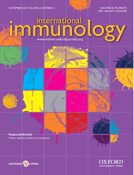
INTERNATIONAL IMMUNOLOGY
Advancing Immunological Insights for a Healthier Tomorrow.INTERNATIONAL IMMUNOLOGY, published by OXFORD UNIV PRESS, stands out as a premier journal in the field of immunology, providing a vital platform for disseminating groundbreaking research and innovative developments within the discipline. With an impressive Q1 ranking in Immunology and Allergy, as well as in Medicine (miscellaneous), it consistently showcases high-impact studies that contribute to the advancement of immunological knowledge. The journal spans over three decades, from its inception in 1989 to its ongoing contributions as of 2024, thus solidifying its reputation in the scientific community. Researchers, professionals, and students will find valuable articles that delve into the complexities of immune responses, therapeutic interventions, and emerging immunological paradigms, ensuring INTERNATIONAL IMMUNOLOGY remains at the forefront of knowledge in the life sciences.
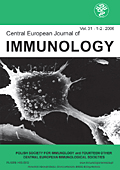
Central European Journal of Immunology
Transforming Research into Impactful SolutionsCentral European Journal of Immunology is a premier publication dedicated to advancing the field of immunology and allergy research. Established in 1996 and published by TERMEDIA PUBLISHING HOUSE LTD, this open access journal has consistently provided a platform for innovative research and comprehensive reviews since its transition to open access in 2002. With an ISSN of 1426-3912 and E-ISSN of 1644-4124, it embraces a global readership while being rooted in Poland. The journal, with a notable Q3 ranking in both the categories of immunology and allergy in 2023, positions itself within the competitive landscape of scientific discourse, as reflected in its Scopus rankings. Designed for researchers, professionals, and students, the Central European Journal of Immunology not only disseminates significant findings but also fosters collaboration and innovation in the immunological sciences, making it a vital resource for those seeking to stay current in this rapidly evolving field.
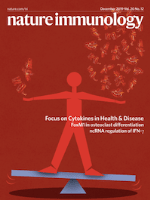
NATURE IMMUNOLOGY
Transforming research into real-world applications in immunology.NATURE IMMUNOLOGY is a premier academic journal published by NATURE PORTFOLIO, dedicated to advancing the field of immunology. With an impressive impact factor that reflects its esteemed position, this journal ranks in the top quartile (Q1) of renowned categories, including Immunology and Allergy. Serving as a crucial platform for researchers, professionals, and students, NATURE IMMUNOLOGY showcases cutting-edge research, comprehensive reviews, and insightful perspectives that drive innovation in immunological science. Based in the United Kingdom, this journal has been a vital contributor to the global discourse on immune responses and related diseases since its inception in 2000. Researchers can benefit from its rigorous peer-review process, ensuring that only high-quality studies are disseminated, thus enhancing their academic pursuits and practical applications. Explore the latest findings and trends within this flourishing discipline, making NATURE IMMUNOLOGY an essential resource for anyone engaged in the study of the immune system.
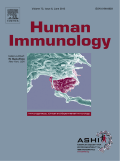
HUMAN IMMUNOLOGY
Pioneering Insights into Immune ResponsesHUMAN IMMUNOLOGY, published by Elsevier Science Inc, serves as a critical platform for disseminating research in the fields of immunology and allergy, as well as various aspects of miscellaneous medicine since its inception in 1980. With an ISSN of 0198-8859 and E-ISSN 1879-1166, this journal is pivotal for researchers and practitioners looking to advance their understanding of human immune responses and related conditions. The journal currently holds a respectable position within its field, as highlighted by its 2023 Scopus ranks—#114/233 in Immunology and Allergy and #132/236 in Immunology and Microbiology. Moreover, it maintains a Q2 quartile ranking in both Immunology and Allergy and miscellaneous Medicine, underscoring its influence and reach within the scientific community. Although it does not currently offer Open Access options, HUMAN IMMUNOLOGY remains dedicated to providing valuable insights and fostering academic discourse within its discipline, characterized by a rigorous peer-review process and a focus on innovative research trajectories.